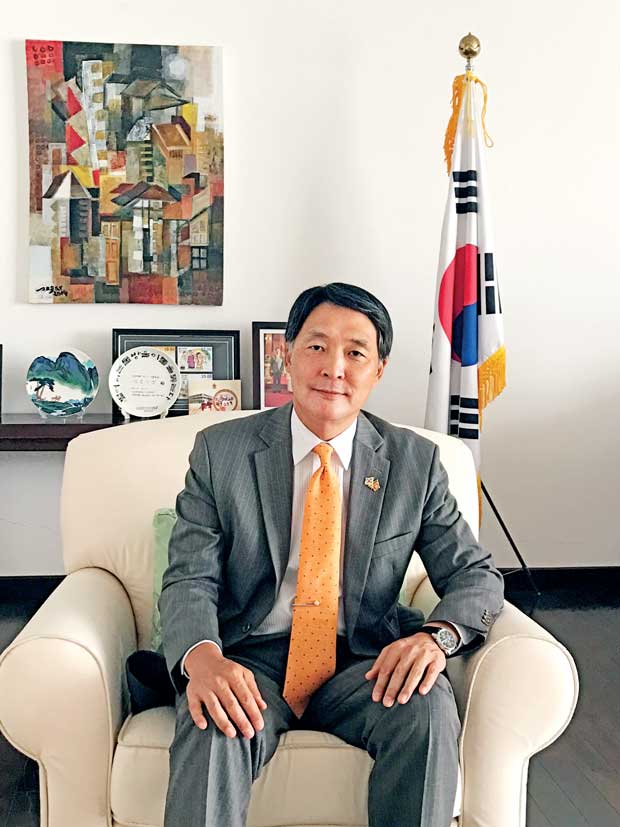14 Jul 2017 - {{hitsCtrl.values.hits}}

Korean Ambassador Won-sam Chang, in an interview with the Daily Mirror, spoke about the new facets of bilateral relations and future prospects. Following are the excerpts of the interview:
Q : What are the new facets of Sri Lanka-South Korea relations?
Well, I am happy to say that since 1977, when our two countries established diplomatic ties, we have made steady progress in various areas of mutual interest, despite some ups and downs. Every year, we are witnessing active and growing exchanges of visits, not only at governmental level, but also at the grassroots level. On the economic front, bilateral trade and investment are also expected to grow in the coming years. Currently, around 27,000 Sri Lankan workers are employed in Korea and are contributing greatly to the economies of both countries.
Furthermore, the recent approval of the USD 200 million concessional loan from the Economic Development Cooperation Fund (EDCF) of Korea  for the Kandy tunnel construction project is another excellent example of our bilateral development cooperation.
for the Kandy tunnel construction project is another excellent example of our bilateral development cooperation.
This attests to Korea’s genuine intention to help Sri Lanka achieve balanced and sustainable socio-economic development. Besides, Korean tourists in growing numbers are visiting the Pearl of the Indian Ocean. Cultural and educational exchanges are also rapidly increasing.
Apart from all these bilateral initiatives, our two countries are also cooperating closely in the international and regional arenas. In particular, Korea, as the only divided country in the world, deeply appreciates Sri Lanka’s strong support for its stance and efforts in maintaining peace and security in Northeast Asia, especially with relation to the North Korean issue.
As you may be aware, this year is very special for us, as it marks the 40th anniversary of diplomatic ties between the two countries. To celebrate this milestone, the two governments are organizing a number of commemorative events. I think that we should make full use of the momentum gained by the focus on the 40th anniversary to further upgrade our relationship.
I believe that this is an excellent time for the two countries, as cooperative partners in Asia, to join hands and pave the way for sustainable peace and prosperity in the 21st century.
On this occasion, the message I would like to convey to my Sri Lankan friends is this: Korea, as a true friend, who harbors no strategic interests or hidden agenda, has only a genuine intention to help Sri Lanka with the sincere hope that our true bonds of friendship and cooperation will pave the way to foster deeper lasting ties which will offer mutual benefits.
Q How does South Korea view the current political environment of Sri Lanka?
I believe that the presidential and general elections, held in January and August 2015 respectively, truly demonstrated that Sri Lanka’s democratic traditions- which are among Asia’s oldest and proudest- are still robust. As a foreigner who witnessed these historic moments unfold, I would like to pay tribute to the Sri Lankan people for achieving such a peaceful political change through the so-called ‘silent revolution’.
pay tribute to the Sri Lankan people for achieving such a peaceful political change through the so-called ‘silent revolution’.
As expected, following the change of government, many changes took place. Some changes are still under way. Especially, the new government started off with the herculean tasks and formidable challenges of achieving national reconciliation and restoring democracy and economic development. On the one hand, Sri Lanka also regained its international reputation as a responsible stakeholder and a staunch advocate of a balanced foreign policy. Of course, meaningful progress has been made in some respects, but the general assessment seems to be that the Sri Lankan people’s high expectations haven’t yet been fully satisfied and more needs to be done.
Sri Lanka also regained its international reputation as a responsible stakeholder and a staunch advocate of a balanced foreign policy. Of course, meaningful progress has been made in some respects, but Sri Lankan people’s high expectations haven’t yet been fully satisfied
In light of the experience of Korea, which faced similar challenges like Sri Lanka now does, I would like to offer, if I may, my personal views on what Sri Lanka needs most at this critical juncture. First and foremost, we need to have “a sense of urgency” that if this generation fails to lay the solid groundwork for the nation-rebuilding process, such a chance may never surface again. The second is that “actions speak louder than words”. Rhetoric itself doesn’t achieve anything. Decisive action, no matter how trivial it is, is far better for the nation than a plethora of fancy slogans and empty rhetoric.The third is “the mindset of putting the common good and national interest first”. Freedom of expression is quite natural and indeed fundamental in any democratic society, but even in the most advanced democracies, there always are certain limits in exercising it. Disregarding legitimate procedures and taking to the streets, putting parochial interests first, without considering the common good, wont bring stability and prosperity but only bring about chaos and poverty. Last is “the self-sacrifice of the older generation”. If we really want our future generation to live in peace and prosperity, with dignity, we need to tighten our belts and become the stepping stones for them. There is no such thing as a free lunch.
I hope that under the excellent leadership of President Maithripala Sirisena and Prime Minister Ranil Wickremesinghe, the government and people of Sri Lanka will indeed build a national consensus and achieve lasting political stability, national reconciliation and economic prosperity. As true friends, the Korean Government and people will always stand by the Sri Lankan Government and its people.
Q Given the tense situation in your country, some Sri Lankans fear of the possible loss of jobs. Your response?
As the Korean Ambassador, I assure you that the Korean Government is making every endeavour to protect the safety and legitimate interests of migrant workers, and that the domestic situation in Korea is calm and peaceful.So workers can go to Korea for the purpose of employment with peace of mind. Furthermore, regardless of tensions on the Korean Peninsula, the Korean Government’s policy of hiring migrant workers under the Employment Permit System(EPS) will continue for a considerable period of time.
As of March 2017, around 27,000 Sri Lankan workers are employed in Korea under the EPS and they are experiencing a safe stay in Korea.
What is important to bear in mind is that even though tensions have been mounting again on the Korean Peninsula due to the nuclear weapon and missile tests conducted by North Korea, the South Korean Government, which is fully prepared, wont tolerate any military provocations by North Korea and at the same time will continue to constructively engage with North Korea through dialogue and pressure. Our aim is to establish lasting peace on the Korean Peninsula and ultimately achieve, in a peaceful manner, the reunification of the Korean Peninsula, which remains divided since 1945.
Q How does South Korea view Sri Lanka’s strategic location in the Indian Ocean?
We are fully aware of the significance of Sri Lanka’s strategic position at the center of the Indian Ocean connecting East and West. Unlike big powers which have both geo-political and geo-economic interests in Sri Lanka, Korea attaches more importance to the economic aspects of Sri Lanka’s strategic location. Particularly, Sri Lanka can serve as a valuable major distribution hub and production base for Korean companies, which target markets in South Asia, the Middle East, Africa, and Europe. I expect that more and more Korean companies will come to Sri Lanka to seek business opportunities in the years to come.
Another consideration that I believe is worthy of note is Sri Lanka’s strategic location which could prove to be a double-edged sword. So, I think that Sri Lanka should be wise enough to take full advantage of its strategic position for its economic development and avoid becoming an arena for the power struggle among big powers and instead, play a pivotal role in maintaining regional stability and prosperity.
In a sense, one might say that Korea and Sri Lanka are in the same boat, as our two countries are situated in geo-politically strategic locations adjacent to big powers and have, through history, fostered special ties with these big neighbours. As such, we have every reason to closely cooperate with each other to overcome our common difficulties. In the long term, our two countries, sharing the core interests of peace, stability and prosperity, have great potential to evolve into strategic cooperative partners in Asia.
Q How open is Korea’s employment market for Sri Lankans?
Before I answer this question, let me briefly outline how the EPS in Korea came into being. Coupled with the slowing down of the population growth and the trend of greatly valuing higher education in the late 1980s, many small and medium-sized enterprises (SMEs), mainly in the manufacturing and construction sectors, faced a severe shortage of manpower. Against this backdrop, the Korean Government introduced the EPS in 2004.
Since its introduction, about 4,000-5,000 Sri Lankan workers have been employed annually in Korea, and as of 2016, a total of about 53,000 Sri Lankan workers had benefited from job opportunities in Korea.
As far as I understand, Sri Lankan workers prefer working in Korea, because the EPS of Korea has fair and transparent recruiting procedures, and the Minimum Wage Act and the Labour Standards Act apply equally to both migrant workers and Korean nationals, without any discrimination.
On the same note, we are well aware of the Sri Lankan Government’s request for an increase in the quota. However, we decide the national quotas for migrant workers within the framework of overall ceilings of migrant workers under the EPS, taking into account the rate of illegal stays of workers, preferences of employers, work period and other factors.
In a sense, one might say that Korea and Sri Lanka are in the same boat, as our two countries are situated in geo-politically strategic locations adjacent to big powers and have, through history, fostered special ties with these big neighbours
Because of this reason, if the quota is to be expanded, the Government of Sri Lanka needs to address several issues first, such as reducing the number of illegal stays,minimizing the frequent changing of work place by workers, and shortening the period of the sending procedure in Sri Lanka.
Q How do you view the contributions of Sri Lankans to your economy?
To be frank with you, it is hard to get a clear picture of exactly how much Sri Lankan workers contribute to the Korean economy per se, because we don’t have specific analyses or studies on that. Nevertheless, Korean people know that migrant workers including Sri Lankans are making a meaningful contribution to the Korean economy in their own ways.
According to the statistics available, the majority of Sri Lankan workers are employed in the manufacturing sector and some of them are also working in agriculture, fisheries, construction and service sectors. I believe that they are of great help to small and medium-sized enterprises.
I firmly believe that there is great potential for win-win cooperation to prevail between the two countries within a whole range of areas because our economies complement each other. I hope that with the momentum generated by the 40th anniversary, we will indeed be able to cooperate even more closely
What I want to highlight here is that Sri Lankan workers are a valuable asset contributing not only to the economies of our two countries, but also towards expanding cultural and people-to-people exchanges between us in a spirit of friendship and goodwill. To put it simply, they are playing an important role as a bridge between our two countries.
To drive home this point, I would like to share with you a heartwarming story which made headlines in Korea this February and was also reported here in Sri Lanka. The story, I believe, very vividly illustrates what I’ve been trying to explain.A Sri Lankan worker (Nimal, aged 39) saved an elderly woman from a house fire this February, risking his life. Many Koreans were deeply moved by his selfless and heroic act and I’m sure that this will always stay in the minds of the Korean people, leaving a lasting excellent impression not only of Sri Lankan migrant workers in Korea, but indeed of Sri Lanka itself.
Q How do you view Sri Lanka from an investment perspective?
As you may know, Korea used to be the No.1 foreign investor country in Sri Lanka from the 1990s to the early 2000s. Even though Korean investment in Sri Lanka has decreased, many Korean companies which are competitive internationally, in terms of both price and technology, are now coming to Sri Lanka seeking investment opportunities in key areas such as infrastructure (energy, ports& urban development, transport and ICT), environment (separate garbage collection, garbage disposal & management and sanitation facilities) and climate change, among others.
I firmly believe that there is great potential for win-win cooperation to prevail between the two countries within a whole range of areas because our economies complement each other. I hope that with the momentum generated by the 40th anniversary, we will indeed be able to cooperate even more closely and further expand bilateral trade and investment to our mutual benefit in the coming years.
As a matter of fact, when it comes to foreign investment, it is important to realize that Sri Lanka is competing fiercely against other developing countries in the region. In that sense, you need to produce innovative ways and provide more attractive incentives to drastically improve your track record.
For instance, improving the ease of doing business, cutting red tape, implementing policies in a transparent and consistent manner, simplifying administrative procedures, improving coordination and communication among government authorities and strengthening the linkages with neighbouring markets through FTAs, are important measures needed to attract more foreign investment.
I understand that countries such as Vietnam, Bangladesh, and Myanmar are willing to invite and convince foreign investors not only by providing effective and practical packages, full of substantial benefits such as the provision of land and electricity at a highly concessional rate, but also by providing quick and transparent approval from the relevant authorities.
Needless to say, Korea is very keen to see Sri Lanka continue to achieve economic growth by attracting foreign investment and fostering export-oriented industries. And case studies of other countries and lessons learned can be of tremendous value in realizing this. In this regard, I think that Korea’s experience, accumulated in the course of our rapid economic development, can serve as a valuable frame of reference for Sri Lanka. And I assure you that Korea stands ready and is willing, as a mango friend, to render its full assistance to Sri Lanka.
29 Oct 2024 29 Oct 2024
29 Oct 2024 29 Oct 2024
29 Oct 2024 29 Oct 2024
29 Oct 2024 29 Oct 2024
29 Oct 2024 29 Oct 2024